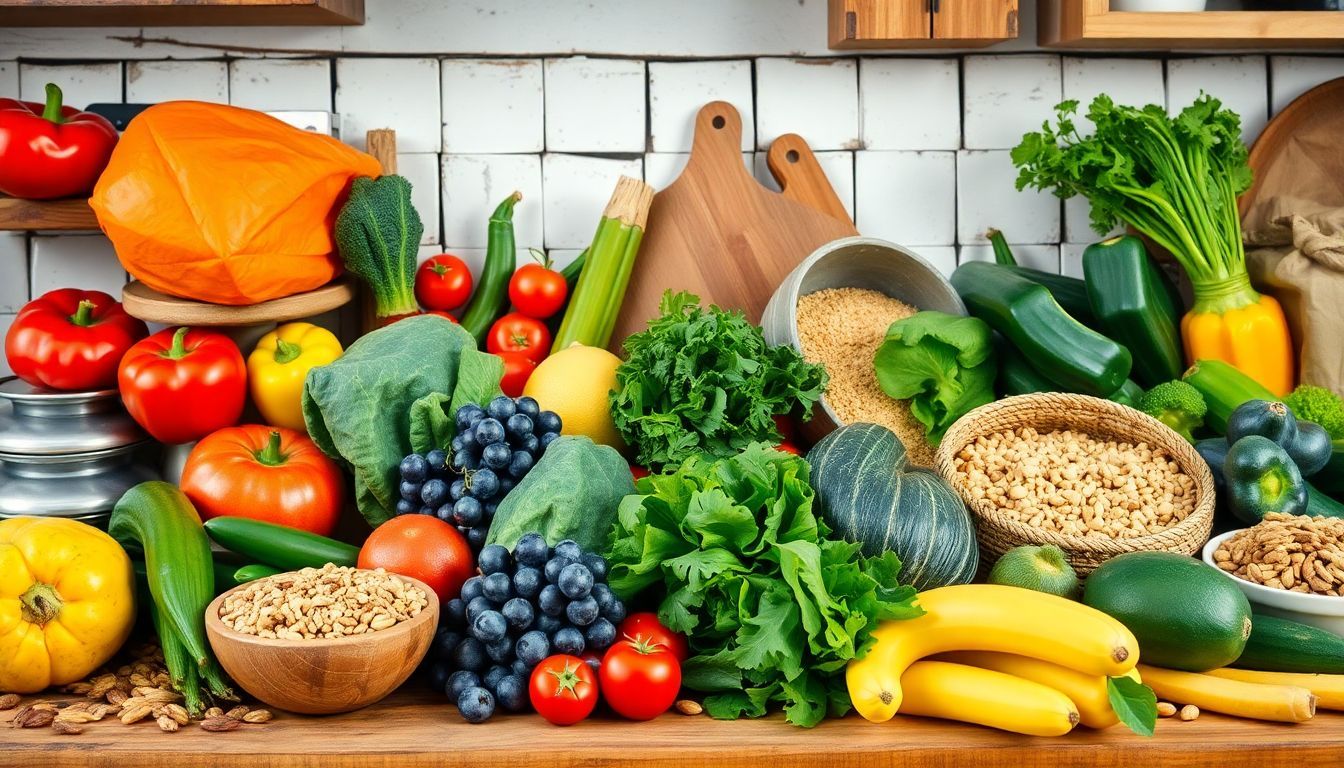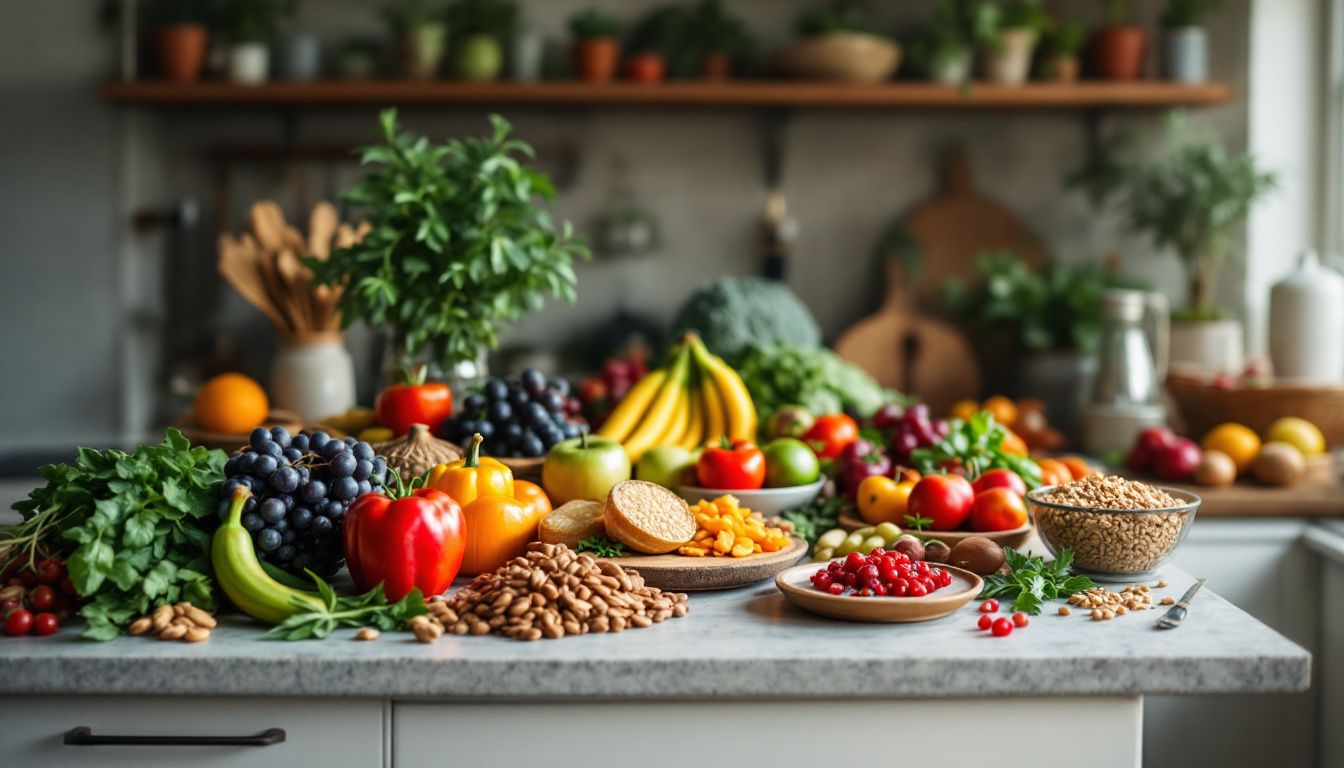Thinking about going vegetarian but not sure where to start? A plant-based diet can bring many health benefits, like better heart health and weight control. But it’s important to plan carefully to avoid missing key nutrients, like protein or vitamin B12.
Thank you for reading this post, don't forget to subscribe!This guide will help you make the switch smoothly—and stick with it!
Key Takeaways
- A vegetarian diet has health benefits like better heart health and weight control. It’s important to plan meals to include key nutrients such as protein, vitamin B12, iron, and omega-3s.
- Vegetarians can choose from different diets: vegan (no animal products), lacto-ovo (includes dairy and eggs), or partial vegetarian (avoids red meat but allows chicken or fish).
- Key plant-based protein sources are beans, lentils, tofu, nuts, and seeds. Fortified foods or supplements may be needed for nutrients like vitamin B12 and calcium.
- Pairing iron-rich vegetables with foods high in vitamin C helps improve absorption. Leafy greens like spinach also provide other nutrients like Vitamin K for bone health.
- Start gradually by replacing red meat first, planning weekly meals ahead of time, trying new recipes, and being flexible during social events while transitioning fully into a plant-based lifestyle.
Understanding the Basics of Vegetarianism

Switching to a vegetarian diet can mean different things. Some people avoid all animal products and follow vegan diets. Others may choose lacto-ovo vegetarianism, which includes dairy and eggs.
Lacto vegetarians eat dairy but skip eggs, while ovo vegetarians do the opposite—eating eggs but avoiding milk or cheese. Partial vegetarians might cut out red meat but still eat chicken or fish.
Many people pick a plant-based diet for health benefits like lower cholesterol and reduced heart disease risk. Vegetarians tend to consume more vitamins C and E, folic acid, potassium, fiber, and fewer saturated fats than meat lovers.
Religious beliefs also play a role in food choices for some folks. Animal welfare concerns or saving money may influence others too! A well-balanced vegetarian diet often means relying on whole grains, fruits and vegetables—or even trying out new meals from Indian cuisine or Middle Eastern dishes packed with flavor!
Key Nutrients to Focus on When Switching to a Vegetarian Diet
Switching to a vegetarian diet needs planning. Certain nutrients are vital for good health and must be part of your meals.
- Protein
Adults need about 0.4 grams of protein per pound of body weight daily. Vegans may require around 0.45 grams instead. Plant-based protein sources include beans, lentils, nuts, seeds, tofu, and textured vegetable protein. - Vitamin B12
This vitamin is mainly found in animal products—making it tricky for vegetarians or vegans to get enough naturally. Many take supplements or eat fortified foods like soy milk and breakfast cereals. - Iron
Iron from plant-based foods is harder for the body to absorb compared to iron from red meat. Pair leafy greens, beans, and lentils with vitamin C-rich foods like oranges or tomatoes for better absorption. - Omega-3 Fatty Acids
These healthy fats play a role in heart health and brain function. Flaxseeds, chia seeds, walnuts, and algae-based DHA supplements are key sources for those avoiding fish. - Calcium
Strong bones depend on calcium—but cow’s milk isn’t the only option! Vegetables like kale, collards, bok choy, as well as fortified soy milk or orange juice can provide this nutrient. - Vitamin D
Sunshine helps the body create vitamin D naturally but isn’t always reliable year-round. Fortified food products or a vitamin D supplement can fill the gap for vegetarians. - Vitamin K
Leafy greens such as spinach are great sources of this nutrient that supports bone health and blood clotting functions. - Soluble Fiber
Whole grains like oats and barley aid digestion while keeping blood sugar levels steady due to their low glycemic index. - Healthy Fats
Olive oil and canola oil offer heart-friendly unsaturated fats without trans fats often linked to health risks such as cardiac events. - Zinc
Vital for immunity and healing wounds—found in nuts, seeds (like pumpkin), whole grains, and legumes such as chickpeas or black beans.
Eating balanced meals with these nutrients makes vegetarian diets both nutritious and filling…
Tips for a Smooth Transition to a Meatless Lifestyle
Switching to a meatless diet can feel big, but small steps make it easier. These tips help you stay on track and enjoy the process.
- Cut out red meat first. Begin by replacing beef or pork with plant-based protein sources like black beans or soy products.
- Plan your meals weekly. Create a vegetarian meal plan using whole grains, fruits, and vegetables for balance and variety.
- Try new recipes. Use vegetarian cookbooks to spot exciting dishes like Indian cuisine-inspired curries or veggie burgers.
- Focus on short-term goals. Aim for 10 or 30 days of a plant-based diet before making larger commitments.
- Add hearty dishes to gatherings. Bring options like salads or black bean burgers to ensure there’s something filling for you.
- Keep snacks handy. Store energy bars in your bag for emergencies when dining at non-vegetarian-friendly restaurants.
- Be flexible during holidays or outings. Allow yourself some leeway while transitioning—perfection isn’t necessary to see health benefits of vegetarianism.
- Experiment with alternatives slowly. Start with dairy substitutes like almond milk and try mustard-flavored soy hot dogs as fun meat alternatives.
Next, we’ll explore common nutrients you’ll need for a healthy vegetarian diet!
Conclusion
Switching to a vegetarian diet is a big change, but it can be rewarding. Focus on balanced meals with plant-based protein sources, fruits, and vegetables. Plan ahead to avoid unhealthy choices or missed nutrients like vitamin B12 and omega-3s.
Take small steps and enjoy the journey—your health and taste buds will thank you!
References
- https://www.nomeatathlete.com/relax-2/
- https://www.health.harvard.edu/nutrition/becoming-a-vegetarian (2024-07-22)
- https://www.mayoclinic.org/healthy-lifestyle/nutrition-and-healthy-eating/in-depth/vegetarian-diet/art-20046446
- https://pmc.ncbi.nlm.nih.gov/articles/PMC10516628/
- https://www.eatingwell.com/article/7892124/things-i-wish-i-knew-before-becoming-a-vegetarian/
